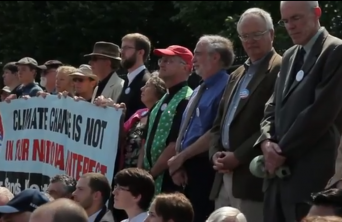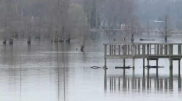UPDATE: Over 500 Arrested At Keystone XL Pipeline Protest
UPDATE:
As of Aug. 30, at least 500 been arrested at the site of the Keystone XL Pipeline protest while government officials seem poised to approve the plan.
David L. Goldwyn, who worked with Secretary of State Hillary Clinton as Special Envoy and Coordinator for International Energy Affairs, told Platts Energy Week he believed Clinton will support the move.
"I think that balancing jobs, energy security -- a country which has increased production potentially the size of Libya -- I think the case for a pipeline is overwhelming, and she will approve it," said Goldwyn.
Last week, the State Department announced its support by releasing a report stating the pipeline would have "no significant impact" on the environment.
Independent analysts and environmentalists disagree. Heather Libby of TckTckTck and Emma Pullman of DeSmogBlog collaborated to create an infographic explaining how the pipeline may threaten the environment it will surround. The graphic outlines the problems found at the existing Keystone facilities and the dangers regarding the new pipeline's potential proximity to almost two thousand waterways.
On PBS NewsHour, environmental author and founder of 350.org Bill McKibben debated the pros and cons of the pipeline with Robert Bryce of the Manhattan Institute for Policy Research. Although Bryce emphasized America's need for "cheap, abundant, reliable energy," McKibben spoke about other costs the pipeline could incur.
WATCH:
Watch the full episode. See more PBS NewsHour.
ORIGINAL STORY:
Plans to build a giant pipeline that will transport crude oil from Alberta, Canada to refineries in Texas have sparked a sit-in protest at the White House.
At least 160 have been arrested since the protest began on August 20, but many environmental activists remain and plan to stay until Sept. 3.
Daniel Kessler, spokesman of the Rainforest Action Network, says the protesters have received heavy resistance from authorities. White House officials have voiced safety concerns as the city prepares for the Aug. 28 designation of the new Martin Luther King Jr. memorial.
"It's kind of ironic," he told USA TODAY. "We're doing this in the spirit of Martin Luther King."
The group is protesting the Keystone XL Pipeline, which would transport oil extracted from Canadian "tar sands" over 1,700 miles across the Great Plains of the U.S.
Although TransCanada had filed a permit for the pipeline in September 2008, its approval has remained in limbo due to economic and environmental concerns. In July, the House Foreign Affairs Committee voted to "promptly authorize" pipeline construction and expedite a decision.
Almost immediately, environmental groups such as the Center for Biological Diversity, Earth Day Network, 350.org and Green America began to organize against the decision. They released letters calling for supporters to stage a sit-in at the nation's capital. Over 2,000 have registered at TarSandsAction.org, the official website of the protest.
WATCH:
Opponents of the pipeline, including the editorial board of the New York Times, are concerned the pipeline will pollute and destroy the area's natural habitat.
According to a recent study by the Canadian government, more than 740,000 acres of boreal forest will be cut down to make way for the line. It also says the more complicated method of extracting oil from tar sands will raise Canada's greenhouse gas emissions by one-third.
Meanwhile, proponents of the pipeline say the construction and maintenance of it will provide more jobs and a secure source of energy. William Hite, general president of the United Association, the union for plumbers and pipe fitters, told the Washington Post it would also help the U.S. become less dependent on foreign oil.
"Everyone's saying we've got to get less dependent on Middle East oil, and this is a perfect opportunity to bring this oil in," said Hite.
Conservative estimates indicate the pipeline would bring an extra 500,000 barrels of oil into the U.S. per day of operation, which is about as much as was imported from Iraq in April of this year.
The State Department announced they will release a decision by November.






